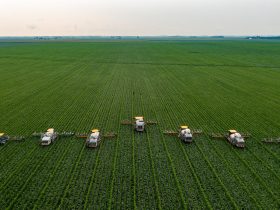In today’s world, where environmental concerns are at the forefront of global discussions, it is crucial to prioritize ethics in promoting environmentally responsible agriculture. Ethical practices in agriculture not only ensure the sustainable use of natural resources but also contribute to the preservation of biodiversity, the reduction of greenhouse gas emissions, and the overall health of ecosystems. In this article, we will explore the importance of ethics in promoting environmentally responsible agriculture and how it can lead to a more sustainable future.
Preservation of Biodiversity
Ethics play a vital role in preserving biodiversity in agricultural practices. By adopting ethical approaches, farmers can protect and enhance the biodiversity within their farming systems. This involves creating habitats for beneficial insects, birds, and other wildlife, as well as implementing practices that minimize the use of harmful pesticides and herbicides.
Preserving biodiversity is crucial as it helps maintain the balance of ecosystems, enhances natural pest control, and promotes the pollination of crops. Ethical farmers understand the importance of maintaining a diverse range of plant and animal species and work towards creating a harmonious coexistence between agriculture and nature.
Furthermore, ethical farmers employ techniques such as agroforestry, which involves planting trees alongside crops. This practice not only provides shade and shelter for wildlife but also helps to sequester carbon dioxide from the atmosphere, mitigating the effects of climate change. By promoting biodiversity, ethical agriculture contributes to the overall health and resilience of ecosystems.
Reduction of Greenhouse Gas Emissions
Ethical agricultural practices also contribute to the reduction of greenhouse gas emissions, which are a major driver of climate change. By implementing sustainable farming methods, such as organic farming and agroforestry, farmers can minimize the use of synthetic fertilizers and pesticides, reduce soil erosion, and sequester carbon in the soil.
Organic farming, for example, avoids the use of synthetic chemicals and instead relies on natural methods to control pests and enrich the soil. This not only reduces the release of greenhouse gases but also helps to maintain soil fertility and promote long-term sustainability.
Agroforestry, on the other hand, involves integrating trees into agricultural systems. Trees not only provide shade and shelter but also absorb carbon dioxide through photosynthesis. This practice helps to offset the emissions generated by agricultural activities and contributes to the overall reduction of greenhouse gas emissions.

Ethical farmers prioritize the health of the environment and recognize their responsibility in mitigating climate change. They adopt practices that promote soil health, such as cover cropping and crop rotation, which enhance carbon sequestration and reduce the need for synthetic inputs. By reducing greenhouse gas emissions, ethical agriculture helps combat climate change and its adverse effects on the planet.
Protection of Water Resources
Ethics in agriculture also extend to the protection of water resources. Ethical farmers understand the importance of responsible water management and strive to minimize water pollution and excessive water usage. They adopt practices such as precision irrigation, water recycling, and the use of cover crops to reduce water runoff and improve water quality.
Precision irrigation involves using technology to deliver water directly to the root zone of plants, minimizing water wastage. This practice not only conserves water but also reduces the leaching of nutrients and chemicals into water bodies, preventing water pollution.
Water recycling is another important practice in ethical agriculture. Farmers collect and treat wastewater for reuse in irrigation, reducing the demand for freshwater resources. This not only conserves water but also helps to maintain the health of aquatic ecosystems.
The use of cover crops, such as legumes or grasses, helps to prevent soil erosion and improve water infiltration. These crops act as a protective layer, reducing the impact of heavy rainfall and preventing sediment and pollutants from entering water bodies.
By implementing ethical water management practices, farmers can help preserve freshwater ecosystems, maintain the health of aquatic life, and ensure the availability of clean water for future generations. Ethical agriculture recognizes the interconnectedness of water resources and the need to protect this vital element for both human and environmental well-being.
Promotion of Animal Welfare
Ethical agriculture goes beyond environmental considerations and also encompasses the promotion of animal welfare. Ethical farmers prioritize the well-being of the animals under their care, providing them with adequate space, access to pasture, and humane treatment. They avoid the use of unnecessary antibiotics and hormones, opting for natural and holistic approaches to animal health.
Promoting animal welfare in agriculture not only aligns with ethical principles but also contributes to the production of high-quality and healthy food. Ethical farmers recognize the intrinsic value of animals and the importance of treating them with respect and compassion.
In ethical agriculture, animals are allowed to express their natural behaviors and are not subjected to overcrowded or stressful conditions. They are provided with proper nutrition, access to clean water, and appropriate veterinary care. By prioritizing animal welfare, ethical farmers ensure that the animals in their care lead fulfilling lives and are not subjected to unnecessary suffering.
Economic Viability and Social Responsibility
Ethical agriculture not only benefits the environment and animals but also promotes economic viability and social responsibility. By adopting sustainable farming practices, farmers can reduce input costs, improve soil health, and enhance crop productivity. This, in turn, leads to increased profitability and long-term economic sustainability.
Furthermore, ethical agriculture contributes to the local economy by supporting small-scale farmers and promoting local food systems. By purchasing locally produced food, consumers can support ethical farming practices and reduce the carbon footprint associated with long-distance transportation.
Social responsibility is also a key aspect of ethical agriculture. Farmers who prioritize ethical practices often engage with their local communities, providing educational opportunities, job opportunities, and promoting food security. They prioritize fair labor practices, ensuring that workers are treated with dignity and respect.
By considering the economic and social aspects of agriculture, ethical farmers contribute to the overall well-being of society. They create a more sustainable and equitable food system that benefits both producers and consumers.
Conclusion
Ethics play a crucial role in promoting environmentally responsible agriculture. By prioritizing the preservation of biodiversity, reduction of greenhouse gas emissions, protection of water resources, promotion of animal welfare, and economic viability, ethical farmers contribute to a more sustainable and resilient agricultural system. Farmers, consumers, and policymakers need to recognize the importance of ethics in agriculture and work together to create a future where ethical practices are the norm. By doing so, we can ensure a healthier planet for future generations and a more sustainable food system for all.
































